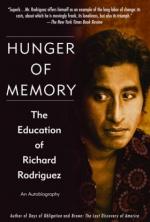
|
| Name: _________________________ | Period: ___________________ |
This test consists of 15 multiple choice questions and 5 short answer questions.
Multiple Choice Questions
1. What was Rodriguez like as a student?
(a) A bookworm who admired his teachers.
(b) A troublemaker who was bored in class.
(c) A slow learner who worked very hard.
(d) The kind of student to whom everything came easily.
2. How does Rodriguez feel about his parents' English skills?
(a) He wishes his mom would do all the talking.
(b) He is troubled by their poor English skills.
(c) He thinks they do all right speaking a mix of Spanish and English.
(d) He is afraid they will get in trouble because they do not speak English properly.
3. How does a scholarship boy form his own ideas or opinions?
(a) He bases his ideas on what he learns in class.
(b) He learns about other's ideas and opinions, but does not have his own ideas.
(c) He bases his ideas on what his teacher tells him.
(d) He bases his ideas on what his classmates tell him.
4. What does Rodriguez call the English-speaking people his family interacts with?
(a) Non-Mexicans.
(b) Foreigners.
(c) Gringos.
(d) Otros.
5. In The Achievement of Desire, Chapter 4, how does Rodriguez describe his relationship with his parents?
(a) They are "strangers and relatives."
(b) They are "culturally separated."
(c) They are "the old way and the new way."
(d) They are "warm but uncomfortable."
6. As a young child, how does Rodriguez feel about books?
(a) He thinks they are boring.
(b) He is afraid of them.
(c) He is not really interested in them.
(d) He is excited to learn to read.
7. What is Rodriguez told when he asks questions about the church?
(a) God will answer all your questions.
(b) Asking questions is a good thing to do.
(c) Only ask questions of the priests and nuns.
(d) Do not ask questions; just memorize the right answers.
8. How does Rodriguez feel about his religious education?
(a) It changed his life.
(b) It isolated him.
(c) It helped him become successful.
(d) It kept him closer to his parents.
9. Rodriguez has acknowledged that his relationship with his family changed as he became more educated. What does he say about how that affected his success?
(a) He used it to explain to people what his life was like before he was educated.
(b) He does not complain about the change because he is so glad to be well-educated.
(c) He used it as an excuse to not work very hard.
(d) He used it to motivate him to try harder.
10. How is the "scholarship boy" described?
(a) A good student but a troubled son.
(b) A good student who is guaranteed to succeed.
(c) A good son but a troubled student.
(d) A good son who wants to please his parents.
11. What does Rodriguez wonder about his parents and his education?
(a) If they think he should be studying a different subject.
(b) If they can help him with his homework.
(c) If they will understand the knowledge he gains.
(d) If they think he is trying hard enough in class.
12. What does Rodriguez do in Aria, Chapter 2, that gives him the confidence to speak up in class?
(a) Learning English from listening to the radio.
(b) Getting extra help from the teacher.
(c) Studying with a classmate.
(d) Practicing English with his family.
13. What is Rodriguez told about reading the Bible?
(a) Read it every day.
(b) Read it in the classroom with someone to guide him.
(c) Do not read it at all.
(d) Read it at mass on Sunday.
14. When Rodriguez hears about religious practices that are different from his own, what does he think of them?
(a) He sees how similar they are to his own practices.
(b) He likes them better than his own practices.
(c) He is shocked and thinks they are wrong.
(d) He is curious about them.
15. As Rodriguez reaches the end of his education, what does he have to confront?
(a) His need to get a job.
(b) The discrimination he experiences as a Hispanic man.
(c) His lack of any friends or girlfriends.
(d) His damaged relationship with his parents.
Short Answer Questions
1. How does Rodriguez describe himself as a child?
2. What does Rodriguez say about bilingual education and the language of "separateness"?
3. When does Rodriguez begin to question his religion?
4. How does the family's use of the word "gringo" change as the children learn more English?
5. What two versions of his religion does Rodriguez say his parents had to choose between?
|
This section contains 863 words (approx. 3 pages at 300 words per page) |

|




